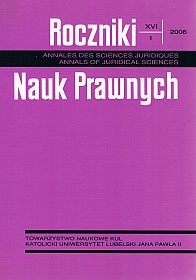Canonic Aspect of the Sacrament of Penance and Reconciliation in the Light of John Paul II’s Motu Proprio „Misericordia Dei”
Abstract
A review of canonic norms concerning the sacrament of penance and reconciliation contained in the article presents a detailed picture of how one should perceive this sacrament in the contemporary Church and in the living conditions of the faithful. Let the detailed directives given by Holy Father John Paul II contained in his Motu proprio “Misericordia Dei” be the conclusion. In his letter the Pope explains what situations are meant when general absolution for the gathered faithful is concerned. Basing on the events that occurred in West European dioceses he defines clearly who is competent for recognizing the given situation as extraordinary and fit for using general absolution, without individually confessing sins. For the Pope the situation is clear and he states that “the judgment on whether the conditions defined by the norm of Canon 961 § 1 n 2 occur does not fall on the confessor but on “the diocesan bishop who, taking into consideration the criteria agreed on with the remaining members of the Conference of the Episcopate, may define the case of such a necessity”. These pastoral criteria should be an expression of utter faithfulness, in the circumstances of the given territory, to the fundamental criteria expressed in the Church's law, that anyway are based on requirements following from the very sacrament of penance understood in such a structure in which it was established by God.
Cases of serious necessity to use the general absolution are characterized by the following features:
a) they are objectively exceptional situations; for instance, a mission territory, where the priest comes very rarely, once or a few times a year, as those are isolated communities; other ones include war, meteorological or similar circumstances;
b) two conditions have been given by the legislator in the canonic norm for occurrence of a serious necessity, namely, 1) the believers' “proper confession”; 2) “in due time”; such an impossibility has to be accompanied by the fact that without their fault “for a long time” they would be left without a chance of receiving the sacramental grace;
c) the first condition, that is the impossibility of a “proper” confession “in due time” refers only to the time that is reasonably necessary to fulfill what is necessary for the sacrament to be administered in a valid and worthy way, and not to have a long pastoral conversation that cannot be put off until the circumstances are more favorable. Time reasonably necessary to hear the penitents' confessions will depend on the confessor's or confessors' mental and physical shape and on the very penitents;
d) as far as the second condition is concerned, reasonable judgment is necessary to assess how long the period of depravation of sacramental grace should be, so that a real impossibility could occur according to Canon 960, since there is no threat of death. Such a judgment is not reasonable if it distorts the meaning of physical or moral impossibility, which would take place, e.g. if it was recognized that a period shorter than one month would mean leaving the penitents “for a long time” in the state of lack of sacramental grace.
Holy Father John Paul II stresses in his letter that the situation should not be brought about of an apparently serious impossibility of going to confession only by neglecting usual and systematic making use of the fruit of the sacrament of penance. Sometimes one has the impression that the faithful treat these two ways of administering the sacrament as equal; whereas actually it is not so, as general absolution is only an extraordinary way, as it was said above. To conclude, let us stress once again that a great number of penitents who turn up due to a parish fair, a pilgrimage, or another popular celebration, is not a reason good enough for the general absolution to be used. Confession as the sacrament of penance and reconciliation has a special meaning for the Catholic Church in the world, as it is an efficient means of presenting individual believers with God's grace in order to restore peace and openness to God in one's conscience. The point is that particular believers should accept understanding of this sacrament, and confessors should give a good testimony about confession with their service.
Copyright (c) 2006 Roczniki Nauk Prawnych

This work is licensed under a Creative Commons Attribution-NonCommercial-NoDerivatives 4.0 International License.


